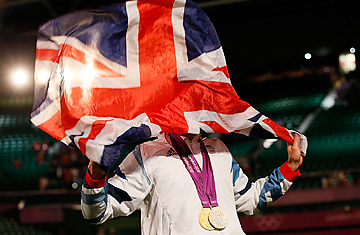
Andy Murray is covered by his British flag as poses with his two medals during the presentation ceremony for tennis mixed doubles at the All England Lawn Tennis Club during the London 2012 Olympic Games August 5, 2012.
I honestly can't believe it," said heptathlete Jessica Ennis, as she joined Britain's fast-swelling ranks of Olympic champions. She wasn't the only Briton to find the reality of victory tough to digest. On Aug. 4, the medals came rolling in. British rowers powered to first place in the men's coxless fours and in the women's lightweight double sculls. The winners expressed surprise and joy. Britain's cyclists seized the top prize in the women's team pursuit. ("It's mad!" exclaimed Laura Trott, a member of the trio. "I can't believe it!")
Then came the three track-and-field golds: for Ennis, for long jumper Greg Rutherford and for Mo Farah, who became the first British athlete to triumph in the 10,000-m race. Eyes glistening, Farah uttered the inevitable words: "I just can't believe it!"
But this isn't a dream. At the time of writing, Britain stands third in the medals table with 22 golds. To understand why that success has left large swaths of the British population wandering around with jaws resting on chests inflated with an unfamiliar sense of pride, you have to understand something of Britain's sporting past and of its history. In the last 100 years, Britain hasn't just lost an empire; it has lost the bedrock of its national identity, the assumption of being a world power economically, militarily — and in the sports it devised or popularized. Every defeat in a game or discipline once dominated by the U.K. serves up a reminder of that wider loss. When English footballers cede a goal to Germany, it feels, in those few seconds, as if there's an alternative universe in which World War II ended quite differently.
These resonances can make the pain of defeat almost intolerable, and because Britons love sport they have long developed coping strategies. The most noticeable of these has been to recalibrate expectations. In their hearts, Brits expect to lose, even if in the run-up to big events they often come close to persuading themselves that their heroes will prevail. This year England's exit from the Euro 2012 football tournament and Andy Murray's defeat by Switzerland's Roger Federer at Wimbledon provided stinging correctives to these flurries of optimism. At the Olympics, Murray beat Federer in straight sets.
He looked as if he expected to win. Facing Federer less than a month earlier, he seemed unnerved by his early lead. Everyone who has ever watched a Briton snatch defeat from the jaws of victory will recognize the syndrome. There's a moment when the athlete thinks, "This cannot be happening," and then everything goes downhill.
Brits excel at losing graciously. The Olympic gold for generosity surely goes to Team Great Britain's male gymnasts, who were already celebrating their silver medal in the July 30 final when a challenge on the scoring for the Japanese team succeeded, demoting the Brits to bronze. "To get a medal is unbelievable," said Team GB's Louis Smith, smiling broadly. "Silver? Bronze? It doesn't matter."
Olympic success — humble victories, admirable defeats, the sensation that the Games themselves are bringing credit to Britain — all of these phenomena are combining to lift the public mood. The U.K. hasn't felt this good about itself for a long time.
Harsher narratives, of economic decline and a fracturing society, held sway until the Games. Aug. 4 wasn't just golden for Britain at the Olympics. It also marked a year to the day since police shot and killed a Tottenham resident, Mark Duggan, sparking violent rioting in many English cities.
The Olympics have afforded glimpses of an alternative vision of Britain, of a nation united. There are huge problems to overcome to realize this vision, in British sport, much less in wider society. More than half of British medalists at the 2008 Beijing Olympics were graduates of the elite fee-paying schools attended by only 7% of the British population. The class-ridden Britain of 1924, depicted in the movie Chariots of Fire, has not yet been consigned to history. The waves of immigrants, recognized in the Games' opening ceremony for their contributions to British life, cannot yet rely on such recognition outside the Olympic Stadium. But they have been represented on the podium as the national anthem plays, and in the life stories of athletes such as Ennis, the daughter of a Jamaican-born father and English mother, and Farah, born in Somalia and raised in the U.K.
Even in the euphoria following these victories, nobody believes a handful of golds can cure all of Britain's ills. For now, though, Britons are daring to think of themselves as winners.
